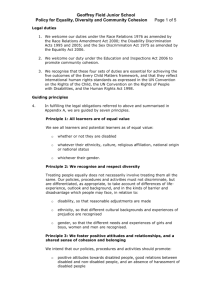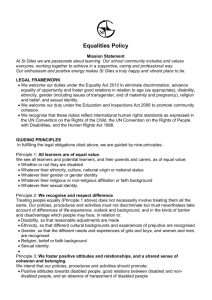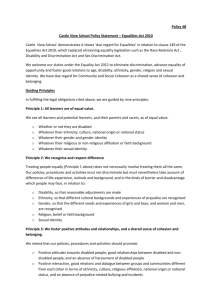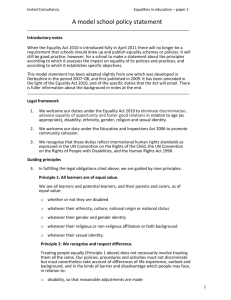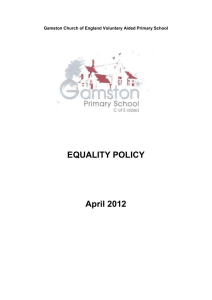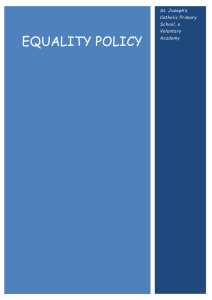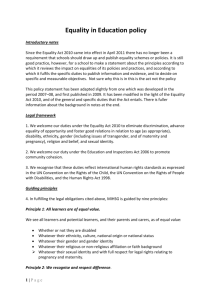Equalities Statement Nov 15
advertisement
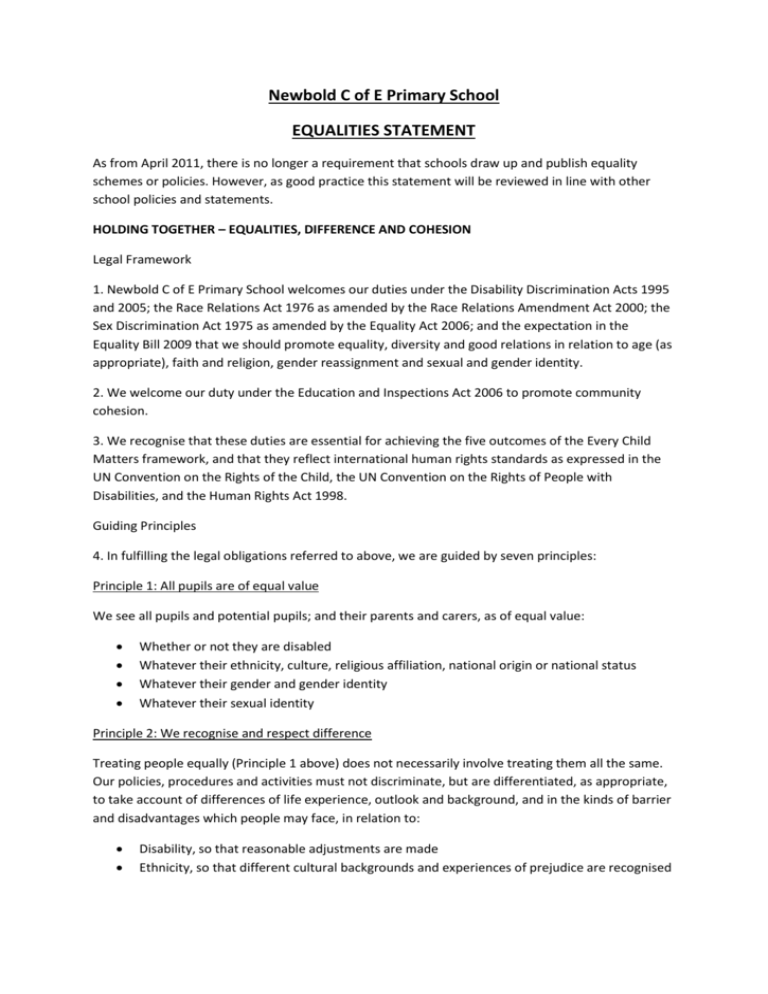
Newbold C of E Primary School EQUALITIES STATEMENT As from April 2011, there is no longer a requirement that schools draw up and publish equality schemes or policies. However, as good practice this statement will be reviewed in line with other school policies and statements. HOLDING TOGETHER – EQUALITIES, DIFFERENCE AND COHESION Legal Framework 1. Newbold C of E Primary School welcomes our duties under the Disability Discrimination Acts 1995 and 2005; the Race Relations Act 1976 as amended by the Race Relations Amendment Act 2000; the Sex Discrimination Act 1975 as amended by the Equality Act 2006; and the expectation in the Equality Bill 2009 that we should promote equality, diversity and good relations in relation to age (as appropriate), faith and religion, gender reassignment and sexual and gender identity. 2. We welcome our duty under the Education and Inspections Act 2006 to promote community cohesion. 3. We recognise that these duties are essential for achieving the five outcomes of the Every Child Matters framework, and that they reflect international human rights standards as expressed in the UN Convention on the Rights of the Child, the UN Convention on the Rights of People with Disabilities, and the Human Rights Act 1998. Guiding Principles 4. In fulfilling the legal obligations referred to above, we are guided by seven principles: Principle 1: All pupils are of equal value We see all pupils and potential pupils; and their parents and carers, as of equal value: Whether or not they are disabled Whatever their ethnicity, culture, religious affiliation, national origin or national status Whatever their gender and gender identity Whatever their sexual identity Principle 2: We recognise and respect difference Treating people equally (Principle 1 above) does not necessarily involve treating them all the same. Our policies, procedures and activities must not discriminate, but are differentiated, as appropriate, to take account of differences of life experience, outlook and background, and in the kinds of barrier and disadvantages which people may face, in relation to: Disability, so that reasonable adjustments are made Ethnicity, so that different cultural backgrounds and experiences of prejudice are recognised Gender, so that the different needs and experiences of girls and boys, and women and men, are recognised. Principle 3: We foster positive attitudes and relationships, and a shared sense of cohesion and belonging We intend that our policies, procedures and activities should promote: Positive attitudes towards disabled people, good relations between disabled and nondisabled people, and an absence of harassment of disabled people. Positive interaction, good relations and dialogue between groups and communities different from each other in terms of ethnicity, culture, religious affiliation, national origin or national status, and an absence of prejudice-related bullying and incidents. Mutual respect and good relations between boys and girls, women and men, and an absence of sexual harassment. Principle 4: Staff recruitment, retention and development We ensure that policies and procedures should benefit all employees and potential employees, for example in recruitment and promotion, and in continuing professional development: Whether or not they are disabled Whatever their ethnicity, culture, religious affiliation, national origin or national status Whichever their gender Principle 5: We aim to reduce and remove inequalities and barriers that already exist In addition to avoiding or minimising possible negative impacts of our policies, we take opportunities to maximise positive impacts by reducing and removing inequalities and barriers that may already exist between: Disabled and non-disabled people People of different ethnic, cultural and religious backgrounds Girls and boys, women and men Principle 6: We consult widely People affected by a policy or activity should be consulted and involved in the design of new policies, and in the review of existing ones. We involve: Disabled people as well as non-disabled People from a range of ethnic, cultural and religious backgrounds Both women and men, and girls and boys Principle 7: Society as a whole should benefit We intend that our policies and activities should benefit society as a whole, both locally and nationally, by fostering greater social cohesion, and greater participation in public life of: Disabled people as well as non-disabled People of a wide range of ethnic, cultural and religious backgrounds Both women and men, girls and boys Action Plans 5. We recognise that the actions resulting from a policy statement such as this are what make a difference. 6. Each year we draw up an action plan within the framework of the overall Newbold C of E Primary School Improvement Plan, setting out the specific actions and projects we shall undertake to implement the principles in paragraph 5 above. The Curriculum 7. We keep each curriculum subject or area under review in order to ensure that teaching and learning reflect the seven principles in paragraph 5 above. Ethos and Organisation 8. We ensure that the principles listed in paragraph 4 above apply to the full range of our policies and practices, including those that are concerned with: Pupils’ progress, attainment and achievement Pupils’ personal development, welfare and well being Teaching styles and strategies Admissions and attendance Staff recruitment, retention and professional development Care, guidance and support Behaviour, discipline and exclusions Working in partnership with parents, carers and guidance Working with the wider community Addressing prejudice and prejudice-related bullying 9. The school is opposed to all forms of prejudice which stand in the way of fulfilling the legal duties referred to in paragraph 1 and 2: Prejudices around disability and special educational needs Prejudices around racism and xenophobia, including those that are directed towards religious groups and communities, for example antisemitism and Islamophobia, and those that are directed against travellers, migrants, refugees and people seeking asylum. Prejudices reflecting sexism and homophobia 10. There is guidance available in our Behaviour Policy on how prejudice-related incidents should be identified, assessed, recorded and dealt with. This is linked to our Behaviour Management System and includes use of the on-line form to notify DCC. 11. We take seriously our obligation to report regularly to the local authority about the numbers, types and seriousness of prejudice-related incidents at Newbold C of E Primary School and how they are dealt with. Roles and Responsibilities 12. The Governing Body is responsible for ensuring that the school complies with legislation, and that this policy and its related procedures and action plan are implemented. 13. The Headteacher is responsible for implementing the policy; for ensuring that all staff are aware of their responsibilities and are given appropriate training and support; and for taking appropriate action in any cases of unlawful discrimination. 14. Departmental Leaders have day-to-day responsibility for coordinating implementation of this policy. 15. All staff are expected to: Promote an inclusive and collaborative ethos in their classroom Deal with any prejudice-related incidents that may occur, including reporting to the Headteacher through use of Incidents Forms. Plan and deliver curricula and lessons that reflect the principles in paragraph 5 above Support pupils in their class for whom English is an additional language Support pupils in their class to whom this policy may have relevance Keep up to date with equalities legislation relevant to their work Information and Resources 16. We ensure that the content of this policy is known to all staff and Governors and, as appropriate, to all pupils and their parents and carers. 17. All staff and Governors have access to a selection of resources which discuss and explain concepts of equality, diversity and community cohesion in appropriate detail. Religious Observance 18. We respect the religious beliefs and practice of all staff, pupils and parents, and comply with reasonable requests relating to religious observance and practice. Staff Development and Training 19. We ensure that all staff, including support and administrative staff, receive appropriate training and opportunities for professional development, both as individuals and as groups or teams. Breaches of this Policy 20. Breaches of this policy will be dealt with in the same ways that breaches of other school policies are dealt with, as determined by the Headteacher and Governing Body. Monitoring and Evaluation 21. We collect, study and use quantitative and qualitative data relating to the implementation of this policy, and make adjustments as appropriate. 22. In particular We collect, analyse and use data in relation to achievement, broken down as appropriate according to disabilities and special educational needs; ethnicity, culture, language, religious affiliation, national origin and national status; and gender. The annual pupil and parent survey will include appropriate questions to determine the effectiveness of this data and will be closely scrutinised. Interviews with SEN and vulnerable children will also be used to assess this policy and inform amendments. Logs such as Behaviour log and the Equalities log (previously bullying, and racism logs) will be examined in detail and reported to Governors to inform policy. This policy was reviewed and approved by Governors on 18th November 2015. Please note the following features: The term ethnicity is used in preference to race or racial group, on the grounds that it better reflects the intentions and concerns of race relations legislation. There are references where appropriate to religious affiliation and identity. There are references where appropriate to sexual identity and to challenging homophobia The duty to promote community cohesion is integrated into the policy, particularly but not only in the third of the seven principles Disability, ethnicity and gender are referred to in alphabetical order, not in the order in which legislation requiring equality schemes and policies was introduced. (taken from Holding Together: equalities, difference and cohesion, published by Trentham Booked in Summer 2009). FGB November 2015

